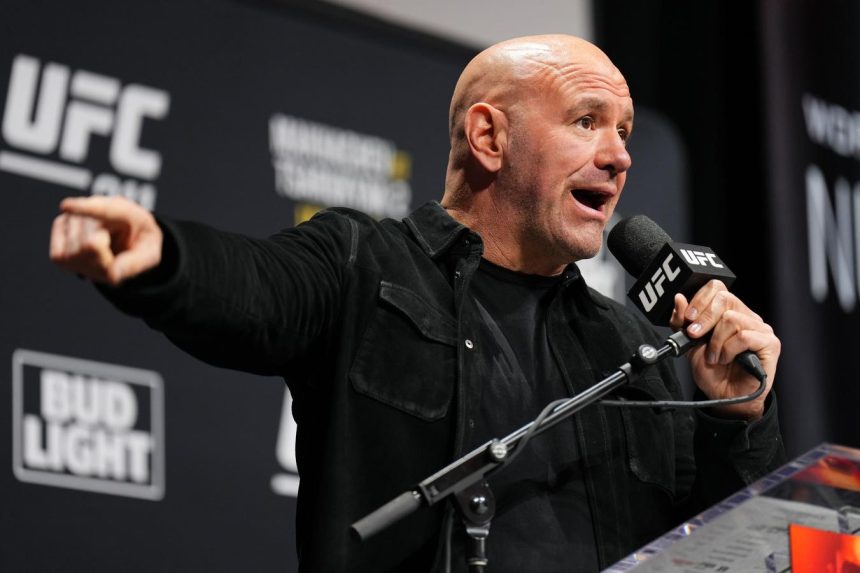The UFC 311 main event was shrouded in last-minute drama when lightweight contender Arman Tsarukyan withdrew from his title fight against champion Islam Makhachev due to a back injury sustained just days before the event. Tsarukyan, ranked number one in the lightweight division, was poised for a rematch against Makhachev, having lost to him in his UFC debut back in 2019. The withdrawal not only derailed the highly anticipated main event but also sparked a debate about Tsarukyan’s future title prospects. UFC President Dana White stated unequivocally that Tsarukyan had lost his opportunity for an immediate title shot and would need to work his way back up the rankings with further victories. However, UFC commentator and former two-division champion Daniel Cormier offered a dissenting opinion, arguing that Tsarukyan’s size, skillset, and potential to pose significant challenges to Makhachev still warranted a title shot, regardless of the unfortunate setback.
Tsarukyan’s withdrawal left the UFC scrambling for a replacement opponent, ultimately settling on Renato Moicano, who stepped up on short notice to face Makhachev. Despite a valiant effort, Moicano succumbed to Makhachev’s dominance in the first round, solidifying the champion’s position at the top of the lightweight division. While Moicano’s willingness to take the fight earned him respect and potentially propelled him up the rankings, it left a void in the immediate title picture. With Tsarukyan sidelined and Moicano coming off a loss, the question of who would be next to challenge Makhachev remained unanswered. Charles Oliveira, a former champion and a dominant force in the division, is widely considered the leading contender, but the uncertainty surrounding Tsarukyan’s future added another layer of complexity to the lightweight title picture.
Dana White’s firm stance on Tsarukyan’s lost opportunity stems from a combination of factors. Firstly, the last-minute withdrawal disrupted the event and forced the UFC to make hasty arrangements for a replacement. Secondly, White has consistently emphasized the importance of seizing opportunities in the UFC, and Tsarukyan’s injury, regardless of its legitimacy, ultimately prevented him from doing so. This principle of meritocracy, coupled with the inherent risks of the sport, underpins White’s decision to sideline Tsarukyan from immediate title contention. While acknowledging Tsarukyan’s talent and ranking, White believes that allowing him to bypass other deserving contenders would undermine the competitive integrity of the division.
Daniel Cormier, on the other hand, sees the situation from a different perspective. As a fighter and analyst, Cormier understands the unpredictable nature of injuries and the impact they can have on an athlete’s career. He recognizes Tsarukyan’s potential to upset Makhachev, citing his size and grappling prowess as key factors that could neutralize the champion’s strengths. Cormier’s argument centers on the idea that Tsarukyan represents the most compelling stylistic matchup for Makhachev, regardless of the recent withdrawal. He believes that overlooking Tsarukyan in favor of other contenders would deprive fans of a potentially thrilling and competitive title fight.
Tsarukyan, meanwhile, maintains that his injury was genuine and debilitating, preventing him from competing at UFC 311. He detailed the sudden onset of back pain, which intensified during his weight cut, ultimately leaving him unable to move. Tsarukyan’s account, supported by medical assessments, paints a picture of an athlete struggling with an unforeseen and incapacitating injury. While some might question the timing of the injury, Tsarukyan’s previous record and dedication to the sport suggest a sincere desire to compete. The unfortunate circumstances surrounding his withdrawal have placed him in a difficult position, forced to defend his integrity while facing an uncertain future in the title picture.
The aftermath of UFC 311 leaves the lightweight division in a state of flux. Makhachev reigns supreme, awaiting his next challenger, while Tsarukyan faces an uphill battle to regain his position as the number one contender. The contrasting viewpoints of Dana White and Daniel Cormier highlight the complexities of navigating injuries, meritocracy, and matchmaking in the high-stakes world of professional MMA. As the dust settles, the UFC must carefully consider the various factors at play to determine the most deserving and compelling next title challenger for Islam Makhachev. Tsarukyan’s fate hangs in the balance, dependent on the UFC’s assessment of his injury, his previous performances, and the overall landscape of the lightweight division.



